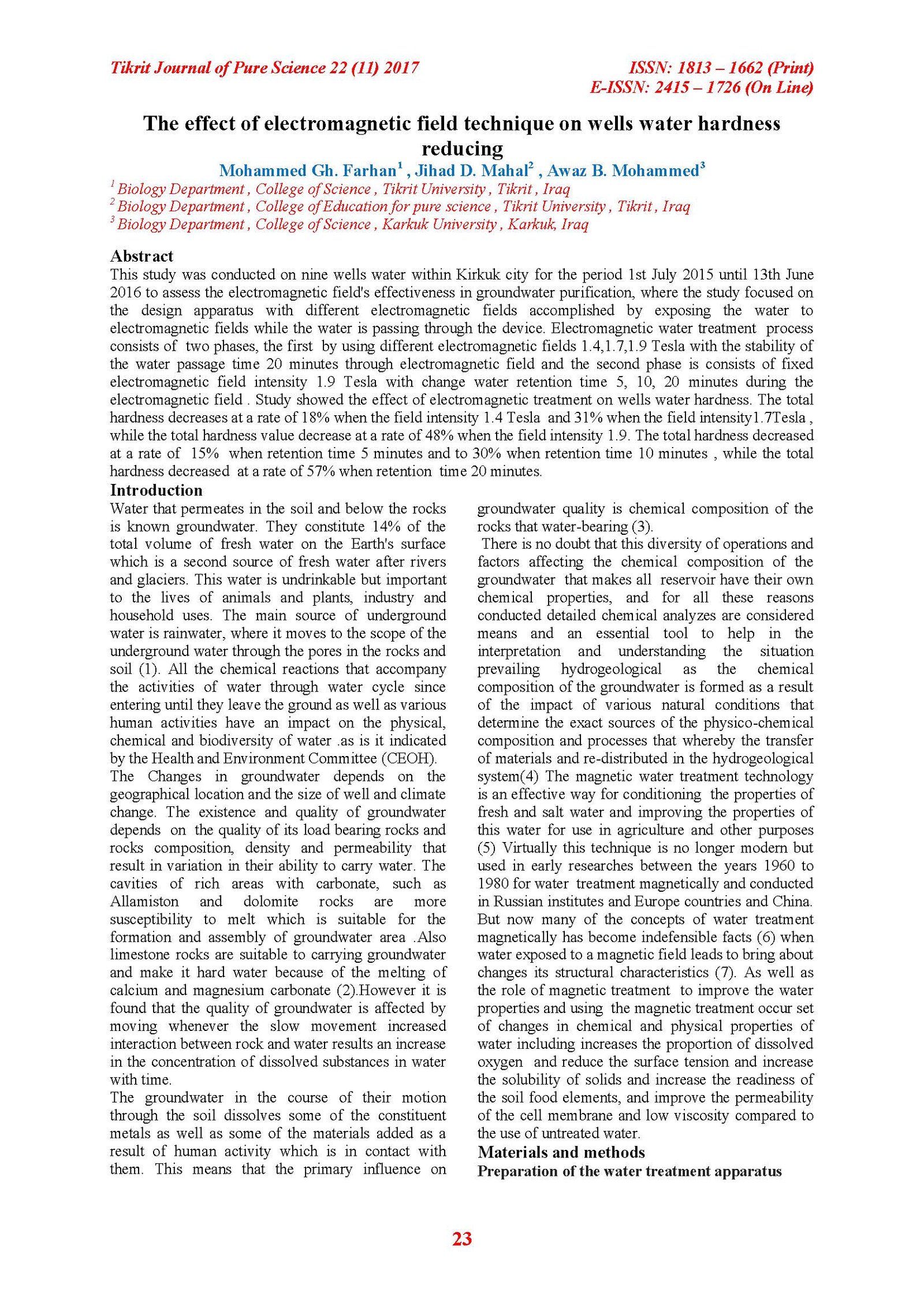The effect of electromagnetic field technique on wells water hardness reducing
Main Article Content
Abstract
This study was conducted on nine wells water within Kirkuk city for the period 1st July 2015 until 13th June 2016 to assess the electromagnetic field's effectiveness in groundwater purification, where the study focused on the design apparatus with different electromagnetic fields accomplished by exposing the water to electromagnetic fields while the water is passing through the device. Electromagnetic water treatment process consists of two phases, the first by using different electromagnetic fields 1.4,1.7,1.9 Tesla with the stability of the water passage time 20 minutes through electromagnetic field and the second phase is consists of fixed electromagnetic field intensity 1.9 Tesla with change water retention time 5, 10, 20 minutes during the electromagnetic field . Study showed the effect of electromagnetic treatment on wells water hardness. The total hardness decreases at a rate of 18% when the field intensity 1.4 Tesla and 31% when the field intensity1.7Tesla , while the total hardness value decrease at a rate of 48% when the field intensity 1.9. The total hardness decreased at a rate of 15% when retention time 5 minutes and to 30% when retention time 10 minutes , while the total hardness decreased at a rate of 57% when retention time 20 minutes
Article Details

This work is licensed under a Creative Commons Attribution 4.0 International License.
Tikrit Journal of Pure Science is licensed under the Creative Commons Attribution 4.0 International License, which allows users to copy, create extracts, abstracts, and new works from the article, alter and revise the article, and make commercial use of the article (including reuse and/or resale of the article by commercial entities), provided the user gives appropriate credit (with a link to the formal publication through the relevant DOI), provides a link to the license, indicates if changes were made, and the licensor is not represented as endorsing the use made of the work. The authors hold the copyright for their published work on the Tikrit J. Pure Sci. website, while Tikrit J. Pure Sci. is responsible for appreciate citation of their work, which is released under CC-BY-4.0, enabling the unrestricted use, distribution, and reproduction of an article in any medium, provided that the original work is properly cited.
References
1-Al-lanqawi, Alham (2012). Ground water, college
of Education, the Public Authority for Applied
Education and Training.
2- Al-Salim, T.H. and Salih, A.M. (2001). Ground
water quality at Al-Rasheedia and Gubaareanorthwest
of Mosul city Iraq. Raf. J. Sci. 12(4) :35-40.
3- Mohammed A. M.(2013). Applied Hydrogeology,
Geology Department College of Science, Tishreen
University Press.
4- Eugene, P.; Adina, P.; Bianca, P.( 2012). Ground
water geochemistry of the Yucatan peninsula,
Mexico: Constraints on stratigraphy and
Hydrogeology. journal of Hydrology 367.
5- Al-Jawthry, H. Attia. (2006). Magnetic effect
adjustment of irrigation water and fertilizer potassium
in some of the chemical characteristics of the soil and
the growth of maize holds. Master Thesis. Baghdad
University, College of Agriculture, Department of
Soil Science and Water Resources.
6- Kronenberg, K. (2005). Magneto hydrodynamics:
The effect of magnets on fluids GMX international.
E.mail: corporate@gmxinterhatinal.com.
7- Martin. C. (2003). Magnetic and electric effects
on water structure and behavior.
www.lsbu.ac.uk/water/Mangetic.htm/tt426.
8- Coey, J.M.D., S., Cass,(2000) Magnetic water
treatment, Journal of Magnetism and Magnetic
Materials, 209, PP: 71-74.
9-APHA (American Public Health Association)
(1999). Standard Methods for the Examination of
Water and wastewater, 20th Edition A.P.H.A.1015
Fifteen Street ,N.W., Washington DC.USA.
10-Gabrielli,C.; Jaonuharly, R.;Maurin; Keddam,
M. (2000). Magnetic water treatment for scale
prevention . Elsevier Science Ltd. All rights reserved
Printed in Great Britain Wat. Res. Vol. 35, No. 13,
pp. 3249–3259.
11- Banejad, H. & Abdosalehi, E. (2009). The
effect of magnetic field on water hardness reducing
.Thirteenth International Water Technology
Conference, IWTC 13, Hurghada, Egypt 117.
12-Guo,H.; liu, Z.; chen, Y.; Yao, R. (2016) Study
of magnetic effects on the physicochemical properties
of individual hydrocarbons. Logistical Engineering
College, Chongqing 400042, P.R China.
13- Jaafar, M. Ch. & Magdi H.Sh. (2015). Use a
magnetic field to improve the performance of
membrane filters used in desalination systems.
Qadisiya Journal of Science and Engineering.
Volume 9 Issue 1.
14- Eid, Zygod. (2006). Contribute to the study of
the influence of magnetic field on the
physicochemical properties of the water. Master
thesis .college of science and engineering sciences.
Kasdi merbah University of Ouargla.
